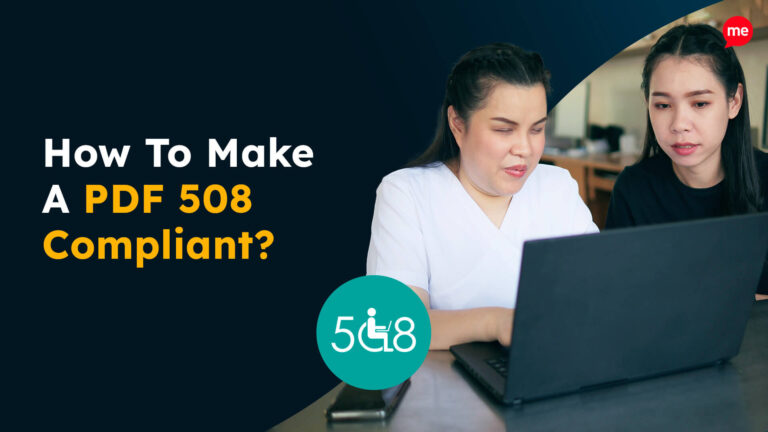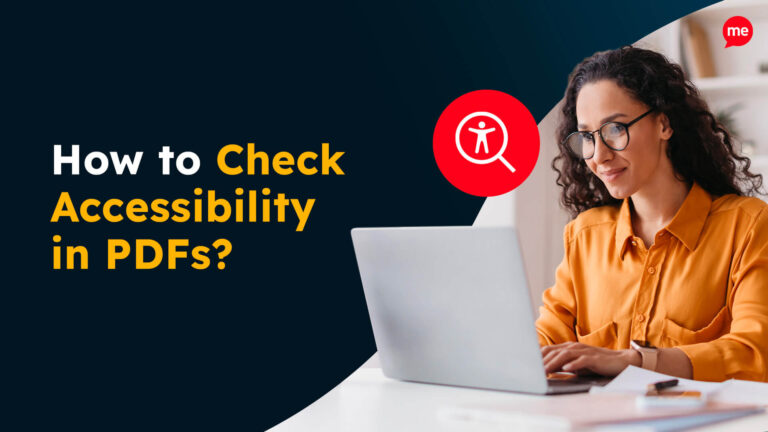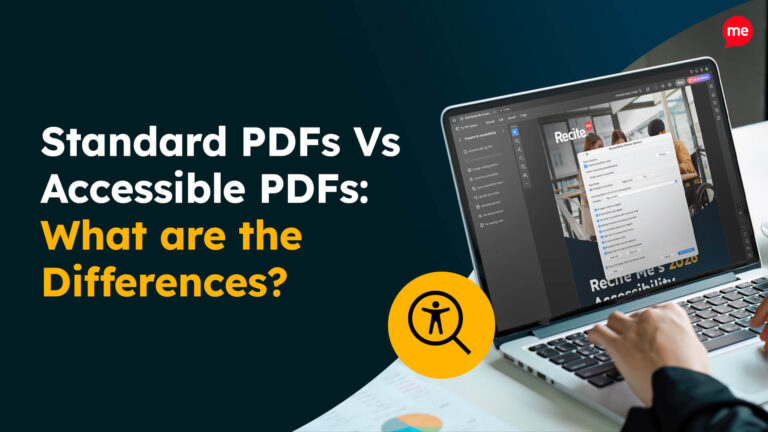Get A Free ADA Compliance Audit Of Your Website
Download NowCDC statistics show that one in four Americans has a disability. In Connecticut, which has a population of over 3.6 million, that equates to over 900,000 people.
Individuals with disabilities often face accessibility hurdles, which legislation has long sought to overcome on a physical level. However, in today’s interconnected world, enhanced accessibility legislation is required to ensure people are not excluded online, too.
Alongside several other proactive states, Connecticut has become one of the first to introduce specific website accessibility guidelines for businesses operating within its counties and jurisdictions. In this handy guide, we’ll outline the relevant policies and explain their significance for various types of organizations.
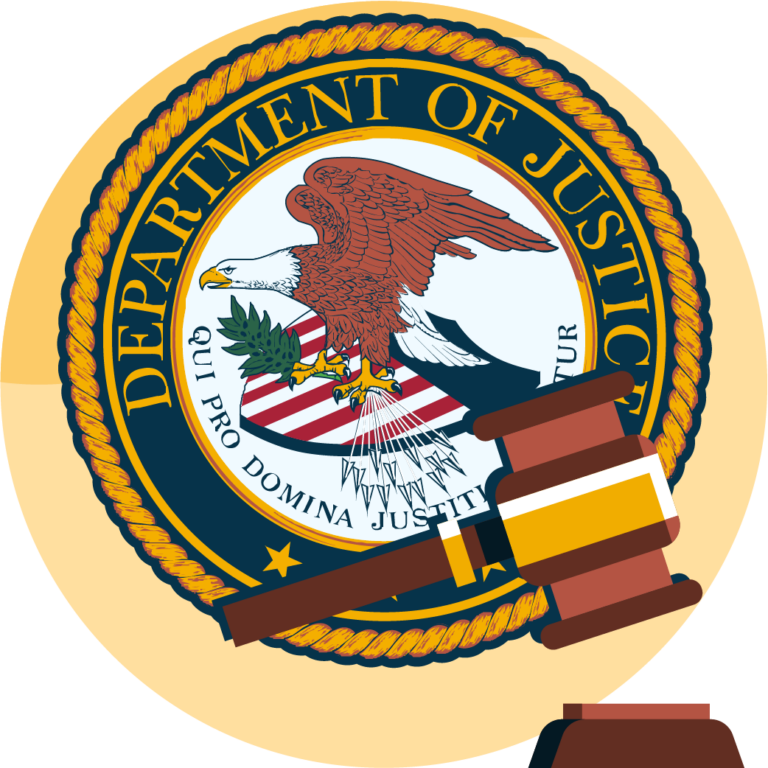
Web Accessibility Laws in Connecticut
Webs accessibility legislation in Connecticut comprises the same federal laws as guidelines that apply elsewhere. However, there are additional state-specific guidelines that only apply to Connecticut-based entities. Here’s a comprehensive overview of all the laws you’ll need to be aware of if your business operates in The Constitution State.
Connecticut’s Universal Website Accessibility Policy for State Websites
Officially, it is the responsibility of each individual agency to become familiar with the relevant federal guidelines and incorporate their principles into the design, build, and publication of state-owned digital assets. However, the Universal Website Accessibility Policy provides additional guidance to ensure state agency websites are developed to serve the largest possible audience. Here’s an overview of what the policy covers:
- Universal design – 16 checkpoints, including criteria for layout, structure, color contrast, and more.
- Text-based design – 7 checkpoints covering punctuation, descriptive text, hyperlinks, etc.
- Graphics and images – 8 checkpoints detailing image size, color resolutions, alt tags, etc.
- Audio and visual features – 5 checkpoints related to transcriptions and captioning.
- Scripts, applets, and plug-ins – Alternative content must be provided when active features are inaccessible or unsupported.
All the checkpoints and criteria listed are based on Web Content Accessibility Guidelines (WCAG) version 2.1, and agencies must be able to meet conformance Level A as a minimum. However, web admins are encouraged to demonstrate compliance with Level AA wherever possible.
The Americans With Disabilities Act
The Americans with Disabilities Act (ADA) is a landmark piece of legislation granting equal opportunities for individuals with disabilities. Originally enacted in 1990 to address physical accessibility challenges, the ADA has evolved to encompass digital spaces, recognizing the critical role of web accessibility in fostering inclusivity.
Within the ADA framework, there are five titles, three of which relate specifically to digital accessibility:
- ADA Title I: Fair Employment – Federal employees with disabilities must have equal access to employment opportunities and all employment-related information.
- ADA Title II: Public Services and Programs – State and local entities must make digital information equally available to disabled citizens.
- ADA Title III: Public-facing Entities – Any organization with a public-facing website must make goods, services, facilities, and accommodations accessible to everyone.

Section 508 of the Rehabilitation Act
Enacted as part of the Rehabilitation Act of 1973, Section 508 mandates accessibility standards for federally-owned electronic and information technology (EIT). The primary goal is to ensure that individuals with disabilities, whether federal employees or members of the public, have equal access to digital resources and services.
Under Section 508, federal agencies are required to make their websites, software, documents, and other digital assets accessible. This includes (but is not limited to) the provision of alternative formats such as text-to-speech options, video captioning, and compatibility with assistive technologies.
What Types of Business Are Affected By Connecticut Web Accessibility Legislation?
Connecticut’s web accessibility legislation casts a wide net. Title III of the ADA and clauses within Section 508 apply equally to private companies and non-profit organizations engaged in contractual relationships as to the government entities themselves. Here’s a breakdown of the types of businesses affected:
- Direct and indirect subcontractors providing services such as technology, software, telecommunications, construction, engineering, etc.
- Non-profit organizations and grant recipients like charities, conservation groups, research institutions, community development organizations, etc.
- For-profit organizations receiving federal funding for government programs spanning healthcare, finance, education, transportation, etc.
Stay ahead of the game when it comes to Digital Accessibility laws and compliance in the United States. Learn about all the different federal and state-level regulations, see real examples of web accessibility lawsuits in different regions and discover a 7-step action plan for building accessible websites.
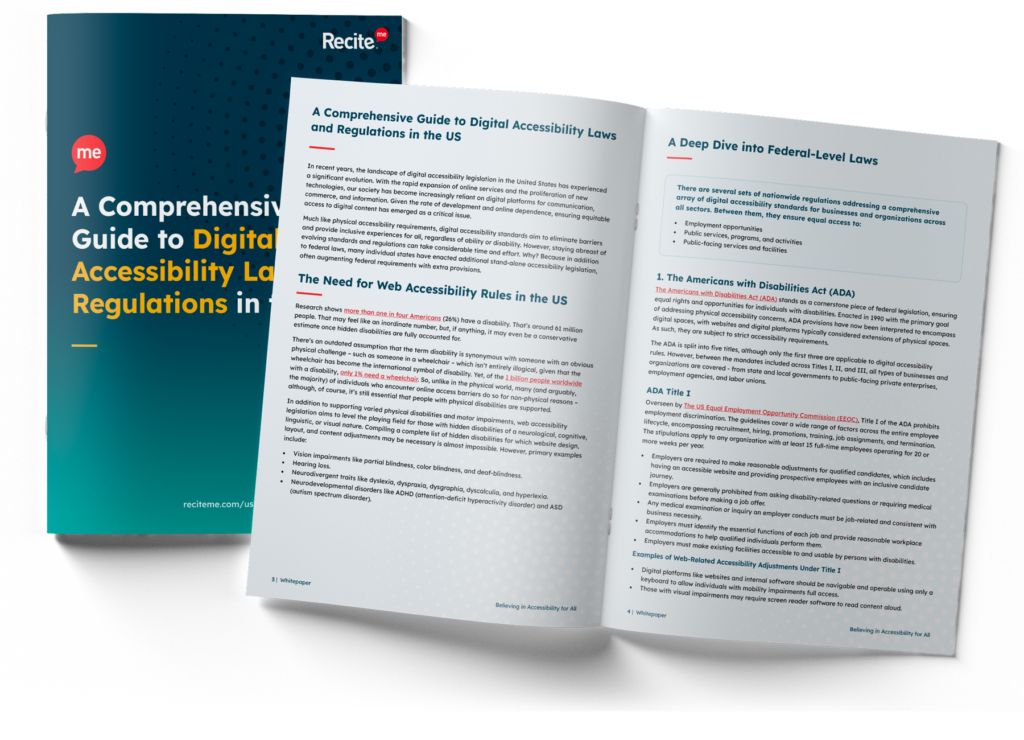
What are The Risks and Consequences of Non-Compliance?
Failure to adhere to Connecticut’s web accessibility legislation can expose businesses to a range of risks and consequences – both financial and reputational. Here’s a list of primary factors to consider.
Financial Penalties
Currently, no financial penalties are attached to non-compliance with Connecticut’s Universal Website Accessibility Policy. However, ADA and Section 508 breaches carry hefty fines starting at $55,000 for the first offense, escalating to $110,000 for subsequent breaches. These fines can quickly add up, particularly in cases of persistent non-compliance.
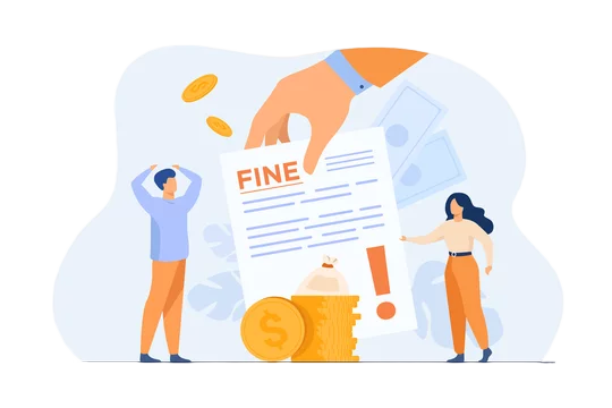
Reputational Damage
Negative publicity associated with web accessibility violations can have lasting effects on a business’s reputation. Repercussions include diminished brand loyalty, reduced market reach, and potential boycott campaigns initiated by advocacy groups or concerned consumers.
Indirect Financial Losses
Beyond direct fines and legal expenses, non-compliance can lead to indirect financial repercussions, such as revenue loss, decreased shareholder confidence, and reduced employee morale. These factors can significantly impact a business’s bottom line and long-term sustainability.
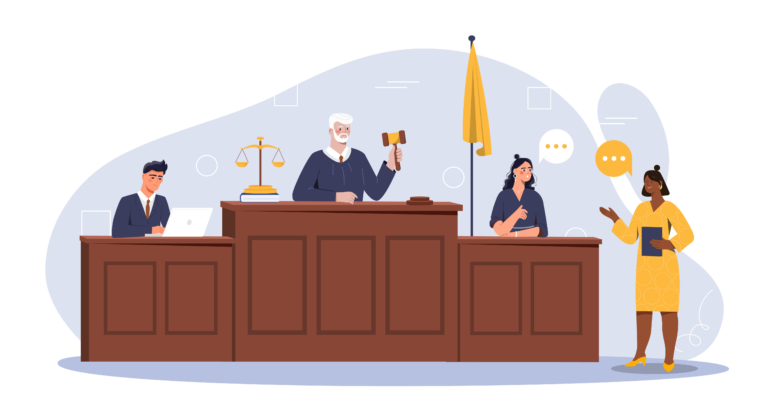
Legal Action and Lawsuits
Lawsuits can be filed by either private citizens or by advocacy groups representing individuals with disabilities. Legal fees, court costs, and settlement sums can be substantial, placing a considerable financial burden on businesses found in breach.
Contractual Repercussions
Any entity receiving government funding or involved in contractual agreements with state agencies risks having their contract revoked for non-compliance. Even when contracts remain in place, there may be more hoops to jump through for renewal, and organizations should expect to face enhanced regulatory scrutiny going forward.
Notable Digital Accessibility Lawsuits in Connecticut
Any company doing business in Connecticut via a website can have a lawsuit filed against them. That means that, aside from state agencies, any of the state’s 88,500+ employer establishments could find themselves in legal hot water for non-compliance.
Here’s a short list of just a few Connecticut companies that have had digital accessibility lawsuits filed against them in the last few years:
- ICON Health & Fitness Inc.
- Garden of Life LLC
- DeMert Brands LLC (doing business as Not Your Mother’s)
- UrbanStems, Inc.
- Lifelock, Inc.
- Bloomscape, Inc.
- Heyday Wellness LLC
- Oral Essentials Inc.
- Vegamour, Inc.
- MoroccanOil Inc.
- All Thnigs BBQ, Inc
- Juneshine, Inc
- Hot Shots Distributing, Inc.
- Betsie Ann Candies, Inc.
- Rocky River LLC
All of the cases above cited ADA Title III criteria in their filings.
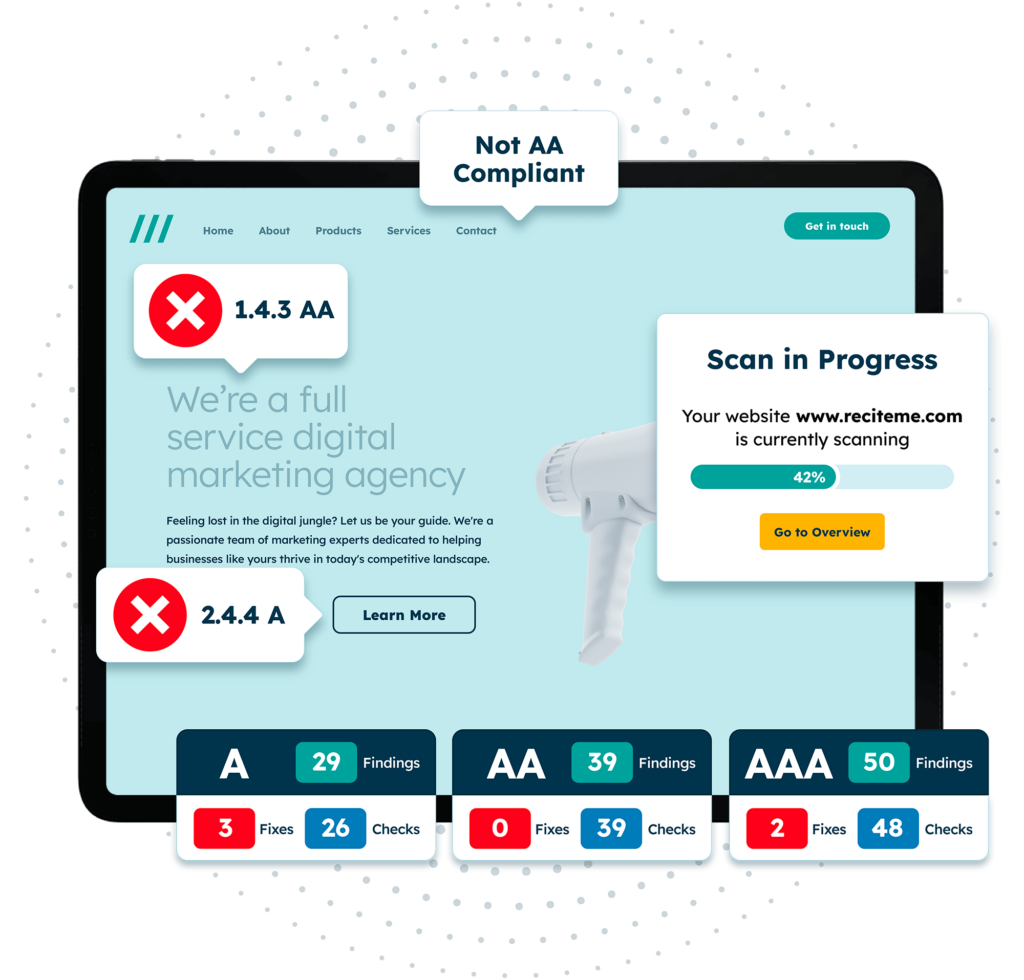
Free Accessibility Check of your Website
Finding accessibility issues is now easier than ever. Recite Me offers a free automated scan of your website’s homepage to highlight non-compliance. You’ll get recommendations on how to fix them, helping to improve your accessibility score.
The Importance of WCAG Compliance
Developed by the World Wide Web Consortium (W3C), WCAG serves as the globally recognized standard for digital accessibility best practices. At the heart of WCAG are the “POUR” principles, which outline key considerations for creating accessible online content:
- Perceivable: Information and user interface components must be presented in ways that users can perceive.
- Operable: User interface components and navigation must be operable by all users, including those with disabilities.
- Understandable: Information and the operation of the user interface must be understandable to users.
- Robust: Content must be robust enough to be interpreted by a wide range of user agents, including assistive technologies.

WCAG criteria are organized into three conformance levels (A, AA, and AAA), spanning varying degrees of accessibility – from basic to advanced.
Connecticut’s Universal Website Accessibility Policy requires compliance with version 2.1 Leval A, while ADA and Section 508 typically require compliance with level AA. However, to ensure alignment with the latest accessibility standards and minimize legal risks, compliance with WCAG 2.2 Level AA is recommended.
How To Make Your Website Compliant with Recite Me
Recite Me’s suite of accessibility-on-demand tools blends compliance with usability, ensuring every action taken leads to a more welcoming digital environment:
- The Recite Me Accessibility Checker guides you through the compliance process, conducting thorough scans aligned with WCAG standards and generating a prioritized fix queue for effective resolution.
- The Recite Me Toolbar empowers users to customize their browsing experience by adjusting font, color, language settings, and more for easy navigation and comprehension.
- Recite Me’s free Accessibility Statement Generator provides a simple way to communicate your dedication to current and future digital accessibility goals.
Need more help to understand and navigate website accessibility legislation in Connecticut? Contact our team today for more advice, run a free check of your website for WCAG compliance, or try our toolbar to see the difference it can make.

